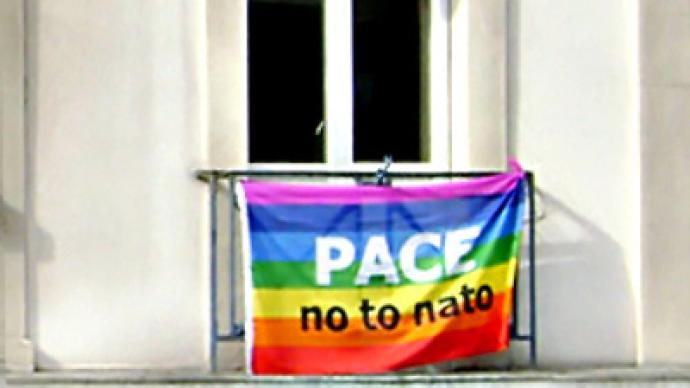NATO Anniversary summit – authorities get the jitters

Only days before NATO’s 60th Anniversary summit, Belgian police arrested 414 protestors at alliance headquarters outside Brussels, and French police have attempted to ban anti-NATO flags from windows in Strasbourg.
In Brussels, ‘Operation NATO Game Over’ was a rehearsal for the Strasbourg Anti-NATO Summit on April 3-4. In an act of civil disobedience, the demonstrators from ‘Action for Peace’ and other groups called for the military alliance to leave Afghanistan and to remove nuclear weapons from Belgian soil.
Demonstrators made no secret of their plans, which were announced on the internet in advance. A massive police presence including water cannon, helicopters, and mounted officers foiled the scheme to block the entrances and windows. However, some demonstrators managed to get into the site. There
was also a symbolic burial ceremony for the military alliance outside the wire perimeter fence. Those arrested were held until around nine in the evening and then released.
Roel Stynen, a spokesman for the protestors, told RT “with the NATO Game Over campaign, two weeks before the Strasbourg summit we give our government a message that's hard to ignore – a military alliance which intervenes worldwide, which deploys nuclear weapons and is prepared to use them, is a threat to world peace. 60 years of NATO is more than enough. It's endangering our security and therefore we want to have an end to NATO. The removal of the US nuclear weapons out of Europe would mean an important boost to the multilateral non-proliferation process and a significant step towards nuclear disarmament worldwide.”
He said the demonstration had raised public awareness about NATO.
“You must remember we have regular meetings and demonstrations, and gradually our arguments are getting through to people even though the government tries to avoid any discussion of the subject”.
He called for a big demonstration in Strasbourg on April 4th.
“Early in the morning, hundreds of activists will try to prevent NATO from meeting with massive street blockades. This action is organised by a coalition of German, French, and international groups. In the afternoon the broad coalition 'No to war – No to NATO', who are also organising the Anti-NATO conference, is calling for a big demonstration in the City of Strasbourg.”
He said the demonstrations would “give a big signal that there were important issues that were not being addressed by governments”. He added that governments continued with the war in Afghanistan despite doubts because “the pressure from the Americans is very difficult to resist. Also, if governments change their minds now it is admitting that they have been wrong for years.”
Anti-NATO organisers generally are reluctant to predict the turn-out for the demonstrations. Helmut Woda, the organiser on the German side of the Rhine, said “it is pointless to predict numbers. We will see when the time comes”. Indications from the internet are that thousands of anti-NATO militants are determined to make their views known. Coaches are being organised for protestors from across Europe particularly Belgium, Greece, and Britain. The annual Easter anti-nuclear march in Kehl is being brought forward by a week for the occasion and a special train will bring activists to the railway station there. Estimates of the likely number of demonstrators vary between 30 and 60,000.
In Strasbourg, police are showing signs of nerves. A resident, Christian Grosse, reports that police visited his flat and demanded that the rainbow coloured flag 'No to NATO' hanging from his window be removed. They told his son who was there alone “either you take it down or we will.” Monsieur Grosse said that as soon as he found out what had happened he had re-placed the flag. He said “this is not an isolated case as 400 such banners were distributed to residents in the centre of the city. He pointed out that ”during the Iraq war (opposed by the French government) there were no objections to the flags but the new regulations fit into the present situation where the authorities are seeking to obstruct the anti-NATO
summit.“ He added that ”he knew of other cases where police had demanded the removal of flags from balconies and windows."
The affair has aroused a national controversy in France. Asked to comment the office of the Mayor of Strasbourg said it was nothing to do with them and referred all enquiries to the Prefect, the representative of the Minister of the Interior and the head of the national police in Strasbourg. After some delay the mayor issued a statement saying that he thought that “it is not acceptable that certain inhabitants of Strasbourg should be given the order to take down flags that are the symbol of peace”. Calls to the Prefecture were not returned. Police finally explained that they were looking for groups of protestors who might make trouble during the summit.
Robert Harneis for RT












